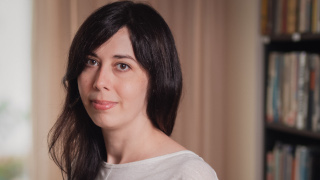Creative Writing Professor Publishes Essay in The Believer Chronicling Onset of Pandemic
Wednesday, April 22, 2020

Adams writes of the experience in which she was scheduled to lead three panels: "We had come to talk about fiction that pushed the boundaries of reality only to find our own reality in question."
The Believer, an eight-time National Magazine Award finalist, is a bimonthly literature, arts, and culture magazine based at the Beverly Rogers, Carol C. Harter Black Mountain Institute, a department of the University of Nevada, Las Vegas.
Cara Blue Adams's stories appear in Granta, American Short Fiction, and The Kenyon Review among other notable literary journals with work forthcoming in Alaska Quarterly Review and Story. A 2018-19 Center for Fiction Emerging Writers Fellow, she has been awarded the Kenyon Review Short Fiction Prize and the Missouri Review Peden Prize, along with support from the Bread Loaf Writers' Conference, the Sewanee Writers' Conference, and the New York State Council on the Arts.
Of the experience at AWP in San Antonio, Adams begins
In early March, the city is experiencing a picturesque spring: the sun shines; the temperature hovers around a pleasant seventy degrees, air freshened with wisteria and the mint-like scent of wild bergamot, birdsong hung in the background like an embroidered tapestry, the pleasant sound continuing long into the mild evenings.
Arriving for the Association of Writers and Writing Programs (AWP) Conference, a person would find no obvious indicators in the city that San Antonio was in a state of emergency, declared by Mayor Ron Nirenberg on March 2 in response to the premature release of a patient with coronavirus into the community. Coming, as it did, two days before the conference was scheduled to begin, the news led to rumors, some attributed to conference staff members, that AWP would be cancelled, and airlines and hotels offered many conference participants refunds before the official announcement came that the conference would indeed go on. I thought briefly about canceling myself, but I had two panels to moderate and was already in Texas, and heading back to New York City hardly seemed more safe. I decided to attend, and the Lyft driver with whom I spoke upon arrival told me that he hadn't noticed any difference in business or in day-to-day life, which seemed true my first night in the city.
But inside the convention center, it was a different story. The registration line on Thursday morning, usually a long and festive one, with people greeting each other, was nonexistent. Participants simply walked up to a kiosk and printed their registration badge before gathering a tote bag and conference program, the whole process taking perhaps four minutes. Piles of unclaimed tote bags sat on the registration tables.
Read more, "Experimental Fiction Panel at the End of the World."
Categories: Arts and Culture






